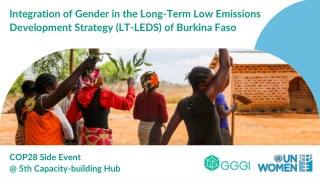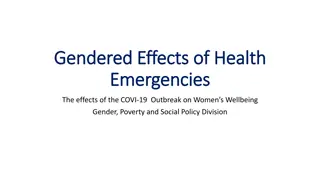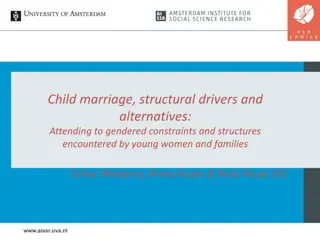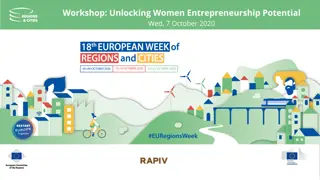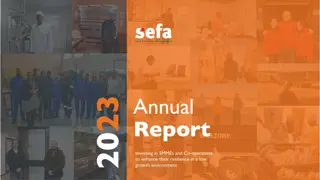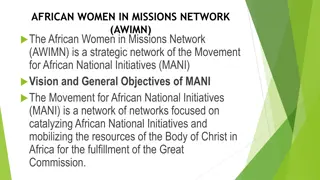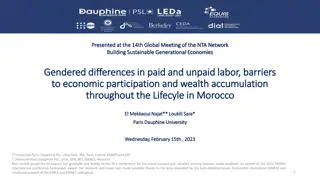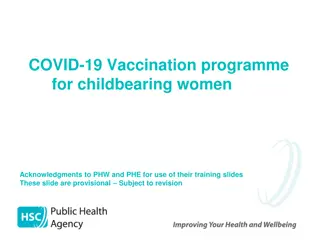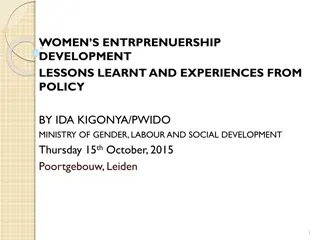Gendered Impact of COVID-19 on African Women Entrepreneurs
Considerable evidence shows COVID-19 disproportionately affects African women entrepreneurs due to poverty and challenges exacerbated by the pandemic. The socio-economic impact reveals how women face increased vulnerability in various sectors, struggle with additional unpaid work, and encounter barriers in technology and entrepreneurship. Structural gender inequalities lead to unequal access to resources and opportunities, while lockdowns contribute to a surge in domestic violence. South Africa's battle against gender-based violence worsens amid the pandemic.
Download Presentation

Please find below an Image/Link to download the presentation.
The content on the website is provided AS IS for your information and personal use only. It may not be sold, licensed, or shared on other websites without obtaining consent from the author.If you encounter any issues during the download, it is possible that the publisher has removed the file from their server.
You are allowed to download the files provided on this website for personal or commercial use, subject to the condition that they are used lawfully. All files are the property of their respective owners.
The content on the website is provided AS IS for your information and personal use only. It may not be sold, licensed, or shared on other websites without obtaining consent from the author.
E N D
Presentation Transcript
1ST INNOVATIONBED.AFRICA FESTIVAL 2020 PRESENTATION BY CINDERELLA OCHU PHD STUDENT, UNIVERSITY OF JOHANNESBURG, JOHANNESBURG, SOUTH AFRICA. 219126442@STUDENT.UJ.AC.ZA
THE GENDERED IMPACT OF COVID-19: A FOCUS ON WOMEN ENTREPRENEURS IN AFRICA
INTRODUCTION There is considerable evidence that COVID-19 has an uneven effect on women across the globe. The case is worse for African women as they battle with poverty and the shock of the coronavirus pandemic. COVID-19 directly impacts on women-owned enterprises and while many are folding up, some are navigating strategies to contain the emerging trend. According to a new assessment by the International Labour Organization (ILO), the economic and labour crisis created by the COVID-19 pandemic could increase global unemployment by almost 25 million, with developing countries accounting for the highest numbers.
THE SOCIO-ECONOMIC IMPACT OF COVID 19 In analyzing the social and economic impact of COVID-19 through a gender lens, the points below are fundamental: Women are more likely to be in service sectors in the front line of COVID support (from personal support workers to grocery clerks) and as such, prone to the virus. As people work from home (WFH) due to lockdowns, women bear the brunt of unpaid work including childcare/homeschooling, domestic chores and care of the elderly. The workload also impacts negatively on the health of women, especially pregnant women. Millions around the world have become unemployed because businesses had to close or severely restrict their operations, leaving especially those in low-skill and low-income positions, many of which are held by women, in situations of even higher economic distress.
THE SOCIO-ECONOMIC IMPACT OF COVID 19 (Contd) In addition to the aforementioned, due to restricted access to education and training, structural barriers and social norms prevalent in Africa, women entrepreneurs are also disproportionately represented at the micro, small and medium level, and women-owned businesses tend to be concentrated in sectors with lower profit margins than men. The number of women found in technology oriented sector is minimal when compared to men. Thus, African women are less knowledgeable and ill-equipped in ICT and struggle to operate at this time. Generally, deeply-rooted structural gender inequalities that exist in Africa, results in unequal access to resources and opportunities for women. There is a surge in domestic violence during the coronavirus lockdown. South Africa for instance had been grappling with the scourge of violence against women long before lockdown was imposed and It only grew worse. "The country battles another deadly epidemic of gender- based violence," the Daily Maverick newspaper warned recently as it became clear the virus had hit South Africa hard. South Africa records the highest cases in Africa.
INNOVATION IN THE AGE OF COVID -19 Transition to digital innovations is one of the critical survival factors in the COVID crisis and many women entrepreneurs are diverting to this to transform and sustain their businesses. Women entrepreneurs are leveraging on e-commerce and reverting to online sales to sell their products and sustain their clientele. This explains why online retailers/stores such as Jumia, Takealot, Amazon and host of others are thriving at this time. Women are also advertising their products using social media platforms such as YouTube, Facebook, Instagram and Whatsapp. This is particularly useful to owners of SMEs.
INNOVATION IN THE AGE OF COVID -19 (Contd) Other entrepreneurs in the service sector now communicate with staff/clients with the aid of Microsoft Teams, Zoom, Skype and other similar tools. Despite the advantages of these platforms to the growth of businesses, many women in Africa cannot access these technologies due to erratic power supply and lack of skill.
CONCLUSION/RECOMMENDATIONS The pandemic is an eye-opener to those who have trivialized the role of technology. Unfortunately, many women-led establishments without online presence or wherewithal have liquidated as a result of COVID-19. However, some are empowering and challenging themselves technologically in order to remain in business. This effort can also serve as a post-pandemic initiative. As such, government support is required.
To this end, the paper puts forward the following recommendations: Gender inclusiveness in planning and leadership o Amid the coronavirus pandemic, a clear trend has emerged; nations led by women have been more proactive at managing the crisis. From Germany's Angela Merkel and New Zealand Prime Minister Jacinda Ardern, to Finland's Sanna Marin, Norway's Erna Solberg, female leaders have reportedly fought COVID-19 outbreaks more efficiently than many others, registering lower cases and lower death rates. o This explains why the United Nations, through its initiative Women Rise for All , is putting women leaders at the forefront of its call to action to meet the challenges of the COVID-19 crisis.
Recommendations (Contd). Gender must be central to post COVID 19 economic recovery o Government relief funds needs to target hard-hit women-led enterprises, grassroot women entrepreneurs and businesses in feminized sectors. Technology is the way o The importance of technology is profound and cannot be overemphasized. Therefore, providing an enabling environment for women to freely access and explore digital opportunities is crucial.




